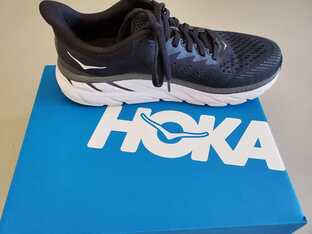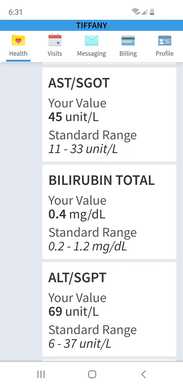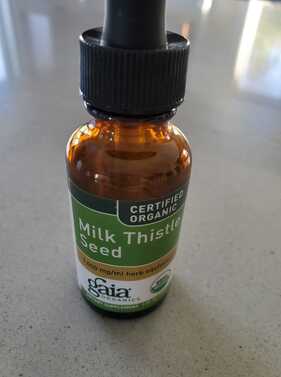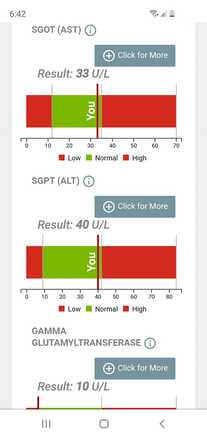
A number of years ago a friend referred me to her internal medicine doctor to help me with my thyroid health. Having been diagnosed in 2002 with the autoimmune condition, Hashimoto's Thyroiditis, I needed a physician who would consider the full picture and not just one or two lab values. Dr. Douglas Brown has been fantastic and truly motivates me to maintain my health and wellness. You can read more about it here: www.hometrainingllc.com/new-blog/true-confessions-for-women-only
The labs he requests are extensive; full metabolic panels, complete thyroid testing, CBC and differentials, a lipid panel and more. These visits have been routine for nearly 10 years. This most recent visit in August, I was surprised to see my liver enzymes were elevated. Typically one might expect elevated enzymes if you frequently imbibe or routinely use Advil and Tylenol. I seldom drink and for a number of years have limited my use of these OTC medicines. In fact, it was a few years ago that Dr. Brown explained to me the significant rise in liver enzymes noted in young women using Advil for PMS symptoms. Due to his caution, I was always careful about utilizing these pain meds and have advised my daughter to do the same. Which of course is why I was surprised to note these values elevated.
The liver is the largest organ in the body and is responsible for many vital life functions. One of its primary functions is to excrete or remove bilirubin, cholesterol, hormones and drugs from the body. In addition it metabolizes fats, proteins, and carbohydrates and also serves as a storage center for glycogen, vitamins and minerals. Among many other functions, the liver works to detoxify and purify your blood breaking down old or damaged blood cells. According to John Hopkins Medicine, more than 500 vital functions, have been identified with the liver. Your liver is constantly striving to improve the internal environment of your body which is why we need to support its efforts with healthy life-style choices.

Elevated liver enzymes may indicate inflammation or damage to cells in the liver. Essentially these enzymes which leak into the bloodstream serve as a warning that the liver is stressed. Last year, my son was diagnosed with the Epstein-Barr virus, or "mono." Whereas my liver enzymes were slightly elevated, his were about 10 times above normal. Considering my mild elevations, if I was a drinker, my first action would be to eliminate alcohol. If I relied routinely on aspirin, tylenol, or advil for pain control I would opt for other methods. But these variables were not the source of the inflammation. In addition, Dr. Brown can look at the cardiac profile where I strive for my HDL (good cholesterol) to be off the charts (avocados, walnuts, salmon, flax seed) and maintain a healthy ratio with the bad guy, LDL cholesterol. My ratio was optimal and my triglycerides were 45; generally anything under 60 is commendable. Based upon the lipid profile, Dr. Brown could confidently say the elevated enzymes were likely not related to my diet. So why were they elevated? In most cases, mild elevations do not signal a serious problem, however being that they had always been at a normal level, I was concerned and curious.
I received my lab values a week before my appointment, so I initiated my own informal research, regarding plausible explanations for elevations in AST and ALT. I recently stopped hormonal birth control after 20 years of nearly continuous use. Estrogen, (including the synthetic estrogen in oral contraceptives) interferes with liver function. Sometimes tests may be abnormal in those on oral contraceptives even though disease is not present. Although I had stopped taking birth control a few weeks prior to my lab tests, I had an odd intuition, that something was off and perhaps estrogen dominance could play a role. As my body weaned off the synthetic estrogen then did its best to fire up my natural estrogen, perhaps it was hormonal overload for my liver.
Secondly, there are cases where supplements can have a negative influence on liver function. I reviewed my supplements list and took it for Dr. Brown to review as well. While most of my supplements were overall supportive, I did reduce my B vitamins, specifically the extra dosage of biotin. Our liver is constantly filtering toxins all around us from the air we breathe, to cleaning products, pesticides in the food we eat. When the liver is overworked, these toxins build up and contribute to non-alcoholic fatty liver disease (NAFLD). Even gluten, which I try hard to avoid, is noted to adversely affect liver function.
Many factors can contribute to NAFLD including poor glucose regulation, insulin resistance, and high cortisol levels (stress hormone). Although I seek to eat healthy, I crave sugar and carbs. My glucose levels were 99mg/dL which is a high normal. The stress hormone cortisol signals the liver to release glucose so that you can "escape" the perceived saber tooth tiger that is chasing you! In this case, maybe the predator is the stress of Covid, chronic "mom worry," relationship stressors, financial concerns or any other 2020 surprise. Everyone has their own perceived stressors but your body doesn't judge; it just responds. The hypothalamic pituitary adrenal (HPA) axis is our central stress response system. This feedback loop can become altered through cortisol production which may result in excess glucose. Poor glucose regulation by the liver can result again in non-alcoholic fatty liver disease (NAFLD).
Secondly, there are cases where supplements can have a negative influence on liver function. I reviewed my supplements list and took it for Dr. Brown to review as well. While most of my supplements were overall supportive, I did reduce my B vitamins, specifically the extra dosage of biotin. Our liver is constantly filtering toxins all around us from the air we breathe, to cleaning products, pesticides in the food we eat. When the liver is overworked, these toxins build up and contribute to non-alcoholic fatty liver disease (NAFLD). Even gluten, which I try hard to avoid, is noted to adversely affect liver function.
Many factors can contribute to NAFLD including poor glucose regulation, insulin resistance, and high cortisol levels (stress hormone). Although I seek to eat healthy, I crave sugar and carbs. My glucose levels were 99mg/dL which is a high normal. The stress hormone cortisol signals the liver to release glucose so that you can "escape" the perceived saber tooth tiger that is chasing you! In this case, maybe the predator is the stress of Covid, chronic "mom worry," relationship stressors, financial concerns or any other 2020 surprise. Everyone has their own perceived stressors but your body doesn't judge; it just responds. The hypothalamic pituitary adrenal (HPA) axis is our central stress response system. This feedback loop can become altered through cortisol production which may result in excess glucose. Poor glucose regulation by the liver can result again in non-alcoholic fatty liver disease (NAFLD).

Finally, even though I am at a healthy weight, I noticed more exists around the mid-section. Dr. Brown was quick to point out that excess abdominal fat may contribute to fatty liver. If I was carrying even a few pounds of extra abdominal fat, he would not be surprised if on my frame, that was enough to elevate my liver enzymes! Whether the issue is related to hormonal excess like estrogen; cortisol and glucose regulation with the HPA axis; or just good old Covid 19 belly fat; he prescribed one thing...EXERCISE, and more specifically, RUN. He even advised me to buy a new pair of running shoes as he knew my history of half-marathons in the past had contributed to some overuse injuries. He also knows that I walk 5+ miles a day but walking does not equate to running in terms of the positive metabolic effect. He made it clear this was not a distance event, but rather 2-3 miles a few times a week to heighten the function of my liver. Whether estrogen dominance, altered stress response or excess fat is to blame for the elevated enzymes, the liver will take care of the problem when given adequate support. Not only did he prescribe running, he also recommended HOKAS, a brand of running shoe he as well as some of his patients have found durable and supportive.

I had an unexpected lab test this week to update an insurance policy. In a matter of 2 weeks my liver enzymes are reduced and within normal limits. Although this was a different company than Froedert Lab, the other values are comparable. Granted, my efforts to reduce the liver enzymes was a multi-modal approach where not only did I run most days of the week; I also added milk thistle seed and even an occasional castor oil pack on my liver (an Aryuvedic approach and likely something our grandparents would recommend). Technically, I am supposed to return to the Froedert lab in two weeks for a repeat test per Dr. Brown. Knowing that the numbers are already trending in a more positive direction, I have to consider if the cost of the lab work is worth the assurance that my efforts are productive. My enzymes were only slightly elevated and no real cause for alarm, however if permitted to continue to climb it could become a serious issue. Maintaining awareness of the body's physiology is important so that one can quickly respond to unexpected alterations. When ignored, a small problem can become a big one. The good news when it comes to NAFLD, there is not a pill to pop, you simply need to make optimal lifestyle choices from movement, to nutrition, to stress management.
Well, this was longer than I intended, but perhaps there is some personal value for your own well-being. Please know, this information is simply related to my personal journey and not necessarily applicable to yours. This is not intended as medical advice but rather encouragement for you to maintain attention to your health and find a provider who looks at the lab values and interprets them in relation to your lifestyle, family history, and total body function. Thanks for reading!
 RSS Feed
RSS Feed